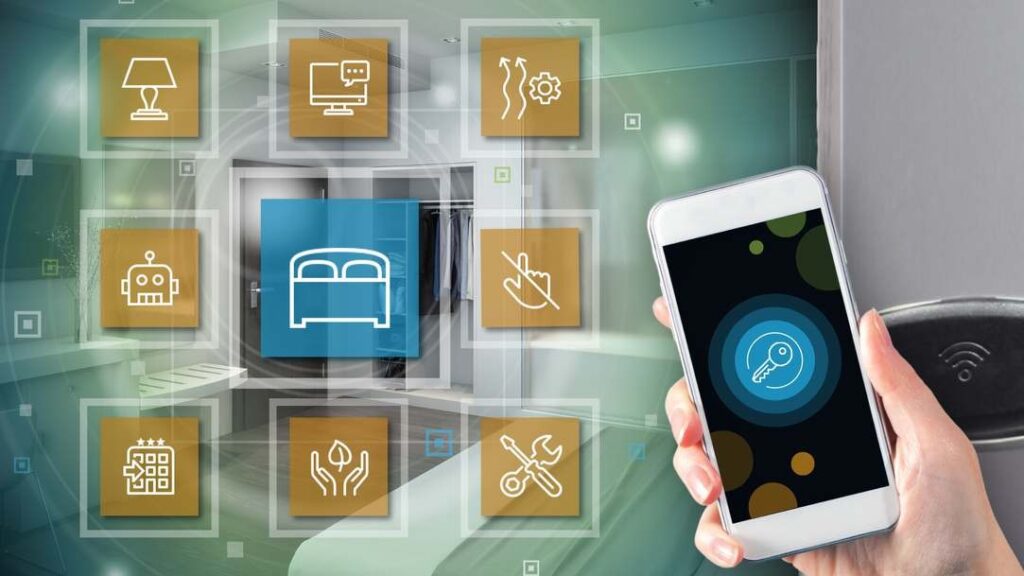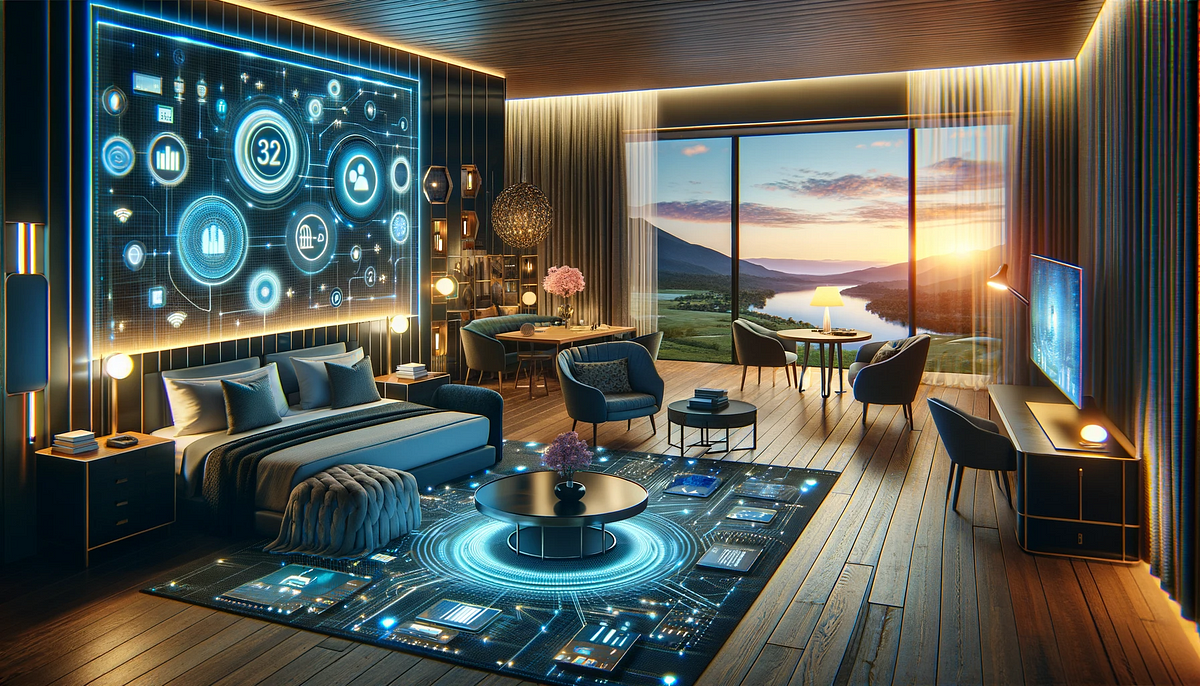Table of Contents
Technology in hospitality industry is essential to continued evolution and competitiveness. Every hospitality business needs information technology to succeed because it gives establishments like restaurants and hotels the tools, they need to improve customer service and streamline operations.
Information Technology Enabled Hospitality

In the hospitality industry, the phrase “information technology” (IT) refers to a broad category of technologies that are used to support and manage operations. This encompasses all of the technology utilized by lodging establishments, eateries, resorts, cruise ships, and other hospitality-related companies.
Among the IT applications used in the hotel sector are:
- Booking Systems and Software for Hotel Management
- Relationship Management for Customers (CRM) Online reservation systems
- point of sale (POS) systems
- Systems for managing restaurant inventories
- Electronic Signage
- Automated Systems for Customer Service.
IT also comprises infrastructural elements that support the seamless operation of hospitality organizations, including as servers, networking devices, and security solutions. Additionally, IT helps hotel companies better guest services, boost customer happiness, and increase operational efficiency.
It is crucial to remember that IT is not just about computers and information networks in the hotel industry. Digital technologies including social media, smartphone apps, payment gateways, analytics, and much more are included as well.
Role of Technology in hospitality industry
Information Technology (IT) has become an indispensable component of the modern hospitality industry. It has revolutionized the way hotels, restaurants, and other hospitality businesses operate, enhancing guest experiences, improving efficiency, and driving revenue.
Here are some key roles of IT in the hospitality industry:
Enhancing Guest Experience
- Online Booking and Reservations: have become a cornerstone of the modern hospitality industry. Guests can now easily book their stays online, often with real-time availability and pricing information. This convenience has significantly increased accessibility and made it easier for travelers to plan their trips. Additionally, online booking platforms often offer features like customizable search filters, reviews, and secure payment options, further enhancing the guest experience
- Mobile Apps: have become an essential tool for hospitality businesses. They offer guests a convenient way to book accommodations, access information, and control room features. Hotels can use mobile apps to provide personalized services, streamline operations, and enhance guest experiences. By integrating with property management systems and other technologies, mobile apps can offer a seamless and efficient guest journey.
- Personalized Service in the hospitality industry involves tailoring services and experiences to meet the individual needs and preferences of each guest. By leveraging data analytics, guest history, and real-time interactions, hotels can offer personalized recommendations, amenities, and services that create a memorable and satisfying stay.
- Social Media Engagement: has become an essential tool for hospitality businesses to connect with guests, build brand awareness, and drive revenue. Hotels, restaurants, and other hospitality establishments can use platforms like Facebook, Instagram, Twitter, and TikTok to share updates, engage with customers, and gather valuable feedback. By leveraging social media, hospitality businesses can create a strong online presence, foster customer loyalty, and stay competitive in today’s digital landscape.
Improving Efficiency and Operations
- Property Management Systems (PMS): have become essential tools in the hospitality industry, streamlining operations and enhancing guest experiences. PMS software integrates various aspects of hotel management, including reservations, front office operations, housekeeping, and accounting. By automating tasks and providing real-time data, PMS enables hotels to improve efficiency, reduce errors, and make data-driven decisions. Additionally, PMS systems often include features like mobile check-in, online booking, and guest communication tools, further enhancing guest satisfaction.
- Revenue Management Systems (RMS): RMS helps hotels optimize pricing strategies to maximize revenue.
- Inventory Management: Technology in hospitality has significantly transformed inventory management in the hospitality industry. It enables hotels to accurately track and manage their stock of supplies, ensuring that they have the necessary items on hand while minimizing waste and costs. Inventory management systems (IMS) can automate tasks like stock counting, reorder point calculations, and supplier management. Additionally, real-time data analytics can provide insights into consumption patterns, helping hotels optimize their inventory levels and reduce food and beverage costs.
- Data Analytics: IT enables hotels to analyze data to identify trends, improve operations, and make data-driven decisions.
Driving Revenue
- Upselling and Cross-Selling: Technology has significantly enhanced the ability of hospitality businesses to upsell and cross-sell. By leveraging data analytics, hotels and restaurants can identify opportunities to offer guests additional products or services that complement their initial booking or purchase.
- Targeted Marketing: Technology has revolutionized the way hospitality businesses reach and engage with their target audience. Targeted marketing, enabled by data analytics and digital tools, allows hotels and restaurants to tailor their marketing efforts to specific guest segments. By analyzing customer data, such as booking history, preferences, and demographics, hospitality businesses can create personalized marketing campaigns that resonate with individual guests.
- Loyalty Programs: Technology has significantly enhanced the effectiveness of loyalty programs in the hospitality industry. Digital platforms allow hotels and restaurants to track guest behaviors, preferences, and spending habits. This data enables them to offer personalized rewards, promotions, and experiences. Additionally, mobile apps and online portals make it easy for guests to earn and redeem points, check their loyalty status, and receive exclusive offers.
Digital Innovation in the Hospitality
Chatbots and artificial intelligence (AI)
Chatbots and artificial intelligence (AI) are being utilized to automate customer service, optimize workflows, and enhance the overall visitor experience. AI-driven chatbots can offer individualized assistance and responses to often requested inquiries, enabling users to quickly solve issues. Predictive analytics is another application of AI that can assist hospitality businesses in foreseeing the demands and preferences of their clients. With the use of technology, hotel and restaurant operators can provide a more personalized experience by getting to know their patrons better.
Kitchen Automation Systems
Restaurants employ automated kitchen technologies to improve productivity and expedite meal preparation. With the help of these technologies, cooks may quickly make meals by ordering goods, determining cooking times and temperatures, and monitoring production. This can shorten service wait times, enhance quality control, and cut down on waste.
CRM Software:
Effective management of client interactions and communications is made possible for hospitality firms by CRM software. Hospitality companies can better understand their visitors’ needs and offer a more tailored experience by tracking consumer data, such as contact details, preferences, and purchase history. Additionally, by using this data to develop focused marketing strategies, more clients may be drawn in and kept.
POS (Point of Sale) Systems
A common digital technology in the hotel industry is point of sale systems. They make it possible for workers at restaurants and hotels to track inventory, handle orders swiftly and efficiently, and accurately bill consumers. By expediting the order taking, payment processing, and other operational detail management processes, these solutions also help lower human error and boost efficiency.
Frequently Asked Questions About the Importance of Information Technology in Hospitality Industry

What is technology integration in the hospitality industry?
The hotel sector has been greatly impacted by the development of information technology. Here are a few instances of how technology in hospitality has altered to hotels and restaurants run their operations:
- Restaurants now have automated payment systems in place that let patrons pay without waiting for a waiter to check out.
- Hotels have embraced digital booking tools that enable visitors to conveniently and securely book rooms online
- Restaurants have the ability to monitor patron preferences and collect information that helps them tailor meals and experiences for their customers.
- Hotel employees may now monitor room occupancy rates, make price adjustments, and offer visitors real-time assistance through mobile devices
- Large volumes of client data can be securely and effectively managed by hotels and restaurants thanks to IT solutions, enabling
How does technology contribute to customer satisfaction in the hospitality industry?
Technology in hospitality contributes to customer satisfaction by:
- Providing personalized experiences: Hotels can use customer data to tailor services and amenities to individual preferences.
- Offering convenience and efficiency: Digital tools, such as online check-in and mobile apps, streamline processes and save time for guests.
- Enabling instant communication: Guests can easily contact hotel staff through chatbots, messaging apps, or social media, receiving prompt responses.
- Offering innovative amenities: Technology-enabled amenities, like in-room entertainment systems and smart thermostats, enhance the guest experience.
- Providing real-time feedback opportunities: Guests can share feedback through online surveys or social media, allowing hotels to address issues promptly.
Overall, technology in hospitality empowers hotels to deliver exceptional guest experiences that exceed expectations.
What are the challenges in using technology in hospitality industry?
- Data Security: Protecting sensitive guest data from cyber threats is a major concern.
- Employee Training: Staff may need extensive training to effectively utilize new technologies.
- Resistance to Change: Some employees or guests may be resistant to adopting new technologies, leading to slower adoption rates.
- Integration Challenges: Integrating different technology systems can be time-consuming and complex.
- Rapid Technological Advancements: Keeping up with the latest technology trends and innovations can be challenging.
Can technology replace humans in hospitality industry?
While machines can automate certain tasks, they cannot replicate the human touch, empathy, and problem-solving abilities that are essential for providing exceptional guest experiences.
Here are some reasons why humans will always be an important part of the hospitality industry:
- Emotional Intelligence: Humans are better at understanding and responding to guests’ emotions, building trust and loyalty.
- Problem-Solving: Humans can adapt to unexpected situations and find creative solutions to problems.
- Personalized Service: Humans can provide personalized service based on individual guest preferences.
- Human Connection: Guests often appreciate the personal interaction with hotel staff.
What Are the Most Commonly Used Technology in Hospitality?
The most commonly used technologies in hospitality include:
- Integrated POS systems
- Artificial intelligence (AI)
- Cloud computing functionalities
- Contactless payments and delivery
- DIGITAL PAYMENT and mobile wallets
- Contact-free hotel check-in/check-out
Why is Technology in Hospitality needed?
Technology is essential in the hospitality industry to enhance guest experiences, improve operational efficiency, and drive revenue. By incorporating digital tools and systems, hotels can offer personalized services, streamline processes, and stay competitive in today’s fast-paced market. Technology in hospitality enables hotels to provide seamless guest experiences, from online booking to in-room amenities, ultimately leading to increased customer satisfaction and loyalty.
What Kind of Technology Does Hospitality Use?
- Integrated POS platforms
- Online booking systems
- Mobile-friendly check-in/check-out procedures
- in room dining features for room service
Key Takeaways
The integration of technology in hospitality industry has significantly transformed the way hotels and other accommodations operate. From online booking and property management systems to mobile apps and AI-powered chatbots, technology has enhanced guest experiences, improved operational efficiency, and driven revenue growth.